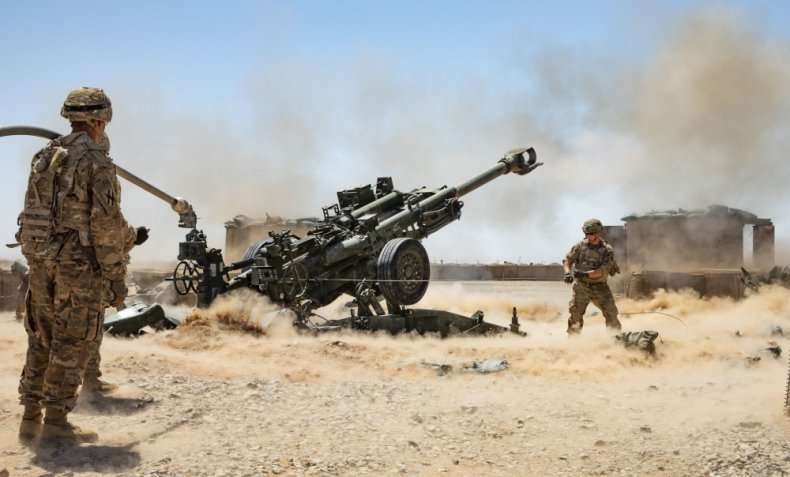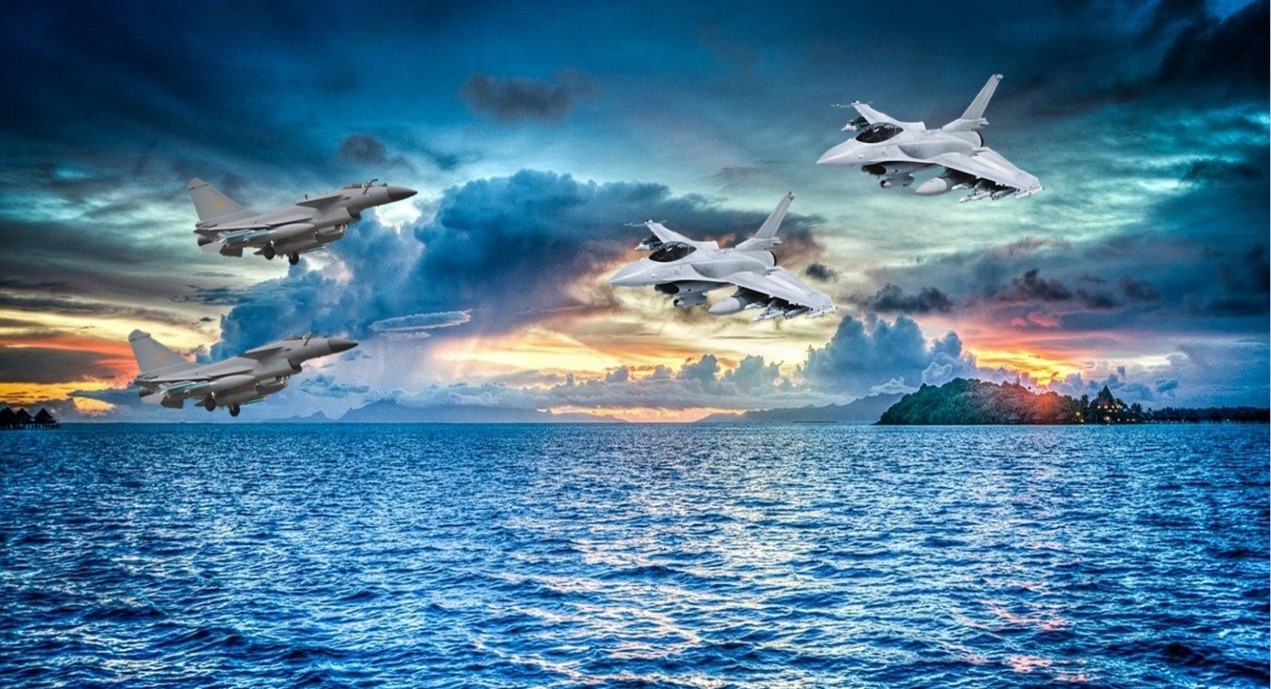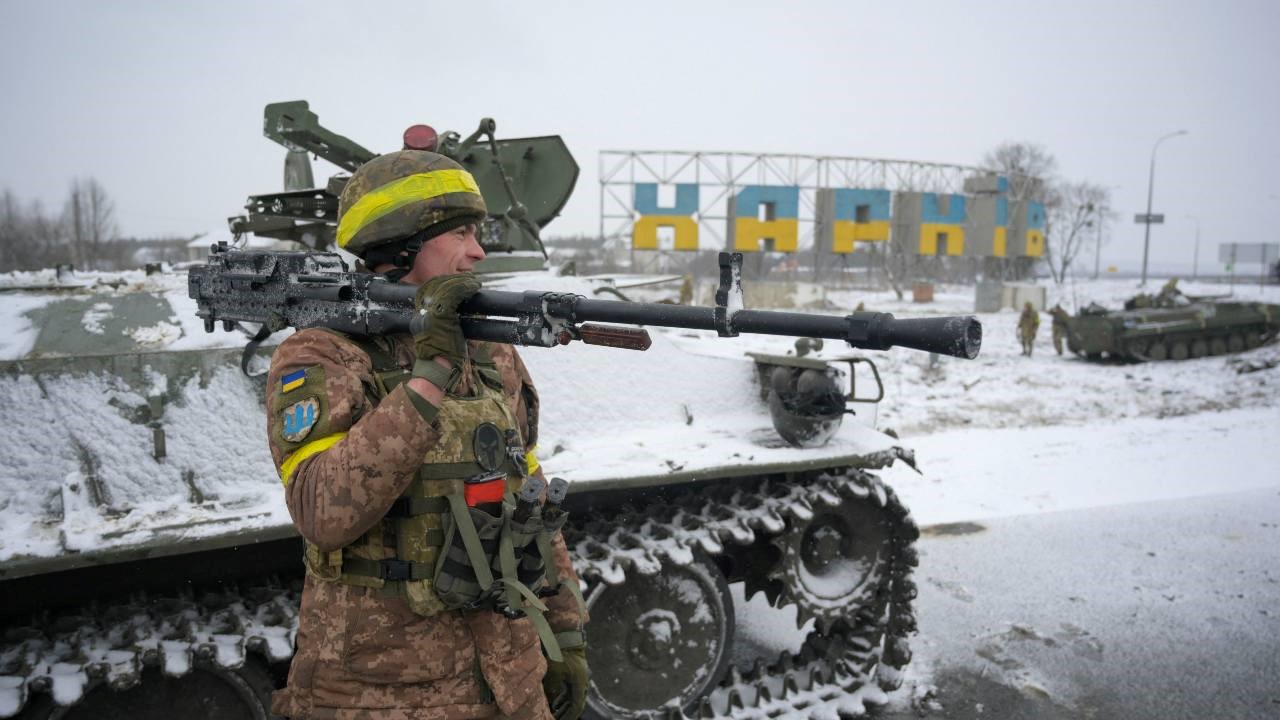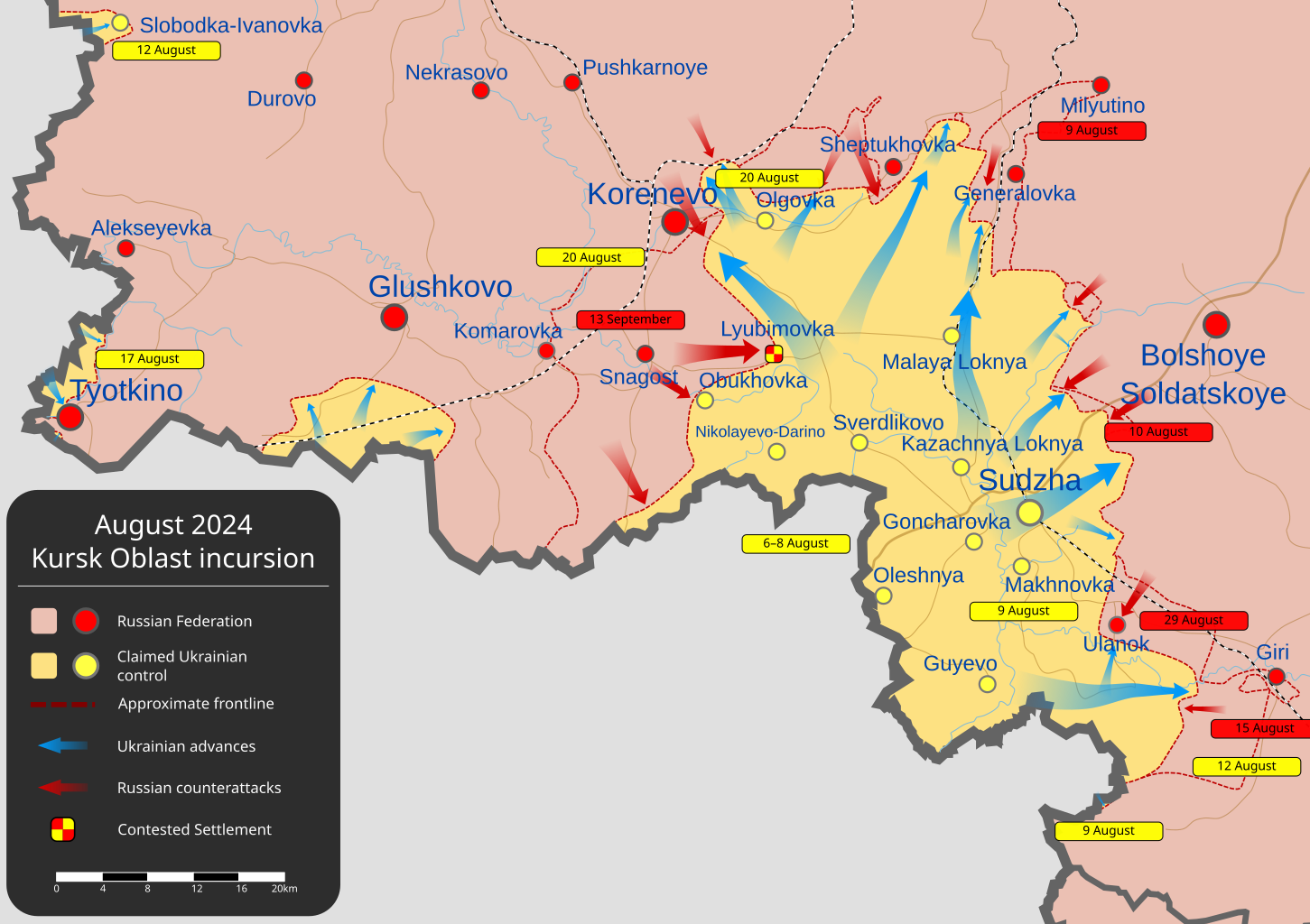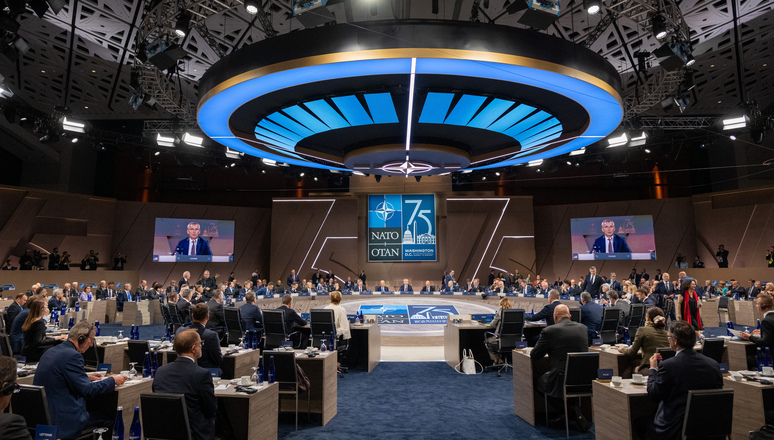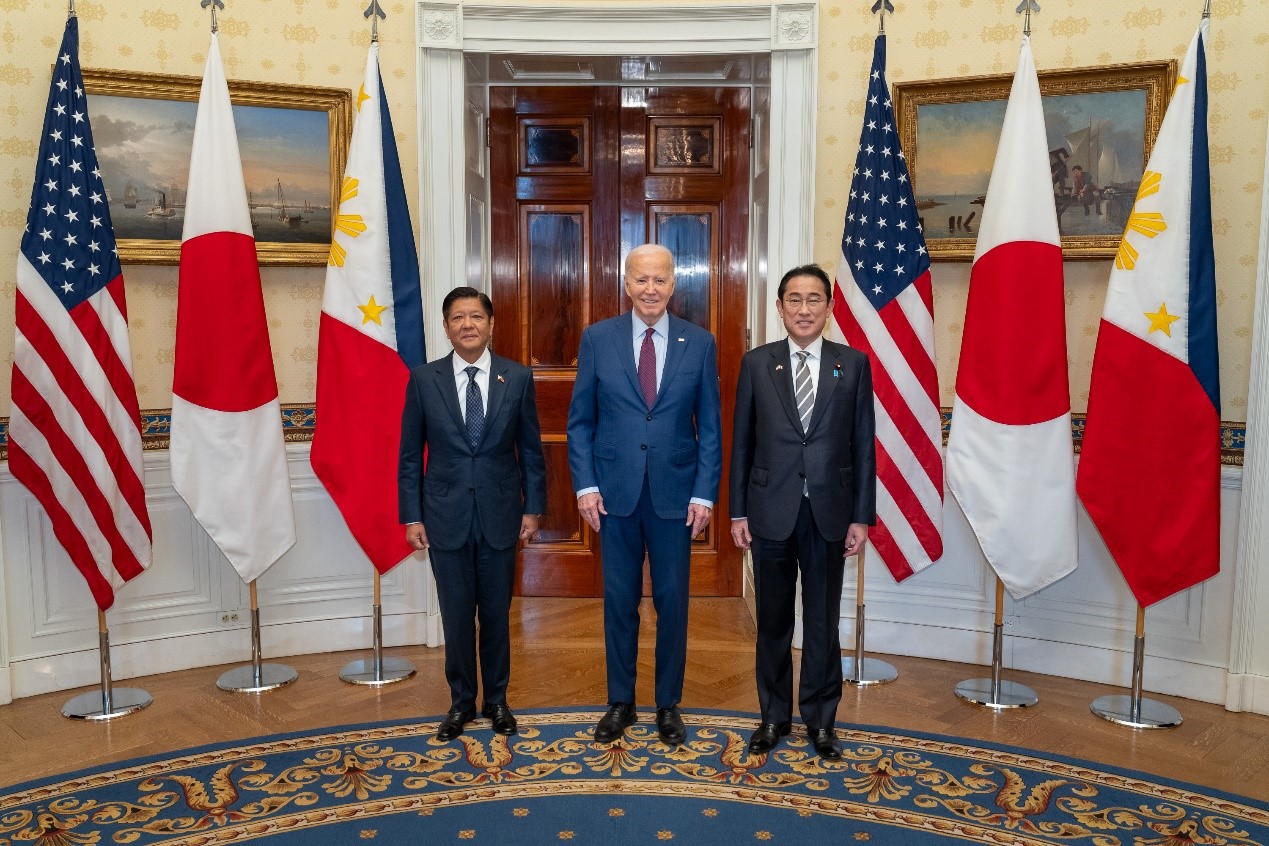Despite the impressive rallying of Western and other nations to Ukraine’s resistance against external aggression, the war is nevertheless a reminder that, at the end of the day, deterrence has failed. Promises of severe economic sanctions, led by the U.S., were insufficient to convince a highly personalistic authoritarian regime centered around Vladimir Putin that the costs of invasion would bev too high.
Picture source: Mary Ellen O'Connell, February 1, 2022, EJIL:Talk!, https://en.wikipedia.org/wiki/File:L%C3%ADdrov%C3%A9_s_koali%C4%8Dn%C3%AD_smlouvou_2021.jpg
Prospects & Perspectives 2022 No. 13
Early Lessons from Russia’s Invasion of Ukraine
By J. Michael Cole
March 17, 2022
As this article is being written, the Russian invasion of Ukraine still rages and the ultimate outcome of that conflagration remains very much in doubt. Still, from the contours of this conflict, a number of conclusions — and lessons — can be extracted which can help Taiwan and its allies better prepare for a future war in the Taiwan Strait.
A very brief history of the road to war
Russian President Vladimir Putin and the propagandists around him have depicted the invasion launched in late February as a necessary defensive action against alleged Western encroachment, chief among them NATO expansion since the collapse of the USSR in 1991, as well as to protect ethnic Russians from the supposed actions of a fascist/Hitlerite regime in Kyiv. All this, however, was a mere smokescreen and distraction from the real causes of the invasion: Putin’s will to power, backed by a cabal of henchmen in the security services, businesses, the Russian Orthodox Church (which is locked in its own dispute for influence with its counterpart in Kyiv), and state control of the narrative via a captive media environment and censorship.
As with the annexation of Crimea in 2014 and the subsequent “grey war” in the eastern part of Ukraine bordering Russia, Putin’s decision to attack Ukraine stems from frustration with the contradiction that a Western-leaning Ukraine poses for Putin’s attempts to resurrect Russian imperialism and, in doing so, to rectify the catastrophe that was the collapse of the USSR and the decade of crisis and humiliation that followed.
Left unsaid (at least in Putin’s close circle) is the fact that the pro-EU/NATO leanings of former Soviet republics like Ukraine and many others originated in the growing sense of insecurity that accompanied Russian revanchism and use of force in the two decades after the collapse of the USSR — among them, the involvement of the Russian military in the Georgian civil war (1991-3); Abkhazia (1991-3); Transnistria (1992); East Prigorodny (1992); Tajikistan (1992-7); Chechnya (1994-6); Dagestan (1999); Chechnya (1999-2009); and Georgia (2008). That insecurity led governments in the Baltics, as well as in the Czech Republic, Poland and other countries to knock at NATO’s door for quick admission to the defense organization — quicker, in some instances, than NATO planners, keen to avoid alienating Moscow, had hoped. While unforced errors and miscommunication can not doubt be blamed on both sides during the 1990s and 2000s regarding NATO expansionism, the notion that the West is solely to blame and that Russia is therefore compelled to react to what it regards as encroachment into its sphere of influence, is outright propaganda; expansion did not occur in a vacuum.
Having ostensibly received a green light from Xi Jinping, and perhaps a commitment on Beijing’s part to help assuage and counter the resulting sanctions, Putin launched the largest ground invasion of a European country since the end of World War II.
(Early) lessons learned
Despite the impressive rallying of Western and other nations to Ukraine’s resistance against external aggression, the war is nevertheless a reminder that, at the end of the day, deterrence has failed. Promises of severe economic sanctions, led by the U.S., were insufficient to convince a highly personalistic authoritarian regime centered around Vladimir Putin that the costs of invasion would be too high. In other words, assumptions of rational decision making were proven wrong. This is a lesson that defense planners in the Indo Pacific should also heed as they prepare their strategies to avert war over the Taiwan Strait. There, too, the longstanding assumption that Beijing would ultimately avoid using force against Taiwan (despite repeated threats) because the leadership would weigh the pros and cons of a military attack and be dissuaded by the latter, needs to be revisited.
This does not mean that, seeing what Putin is doing in Ukraine, Xi will decide to imitate his strategic partner tomorrow morning. For one thing, the travails of the Russian military in Ukraine and the unexpectedly stiff resistance it has encountered, are bound to cause serious debate in the halls of Zhongnanhai. Nevertheless, Putin has demonstrated that the unimaginable can happen and that, left in the hands of dictators with very small circles of advisers around them, decisions over war and peace can be made almost on a whim.
The war in Ukraine demonstrates that the threat of economic sanctions alone is insufficient to deter against attack, especially if the hostile state is given a priori assurances by a large economy that it will help it weather the ensuing sanctions and international opprobrium. While China would struggle to find an ally of a similar economic scale to help it counter sanctions in response to an attack on Taiwan, it is also likely that the international community’s response would be much less united than that which has emerged in response to the assault against Ukraine. The sheer size of China’s economy, the world’s dependence on it, added to the absence of groupings such as the EU or NATO in the Indo Pacific, would undermine the scope, unity, and sustainability of such retaliatory actions.
This, therefore, suggests that in the context of the Taiwan Strait, military deterrence, perhaps involving the deployment of carrier battle groups in Taiwan’s vicinity amid rising tensions, would have to figure more prominently.
Putin has also shown that nuclear blackmail can have a real impact on the willingness of coalitions to become involved in an armed conflict, as is the case with NATO’s refusal to implement a no-fly zone over Ukraine. Having already demonstrated his “irrationality” by launching a war against Ukraine despite the promise of heavy sanctions, Putin’s madness can now convince decision makers in European capitals that he may be mad enough to further escalate by using nuclear weapons against them.
Despite the force disparity between invading and defending forces, the Russian military’s struggle in Ukraine demonstrates that logistics and supply lines are a weak point that can be exploited by the defender. Although such lines would be much shorter in a Taiwan Strait contingency, Taiwan and its allies could nevertheless exploit the many vulnerabilities created by the necessity of launching of an amphibious assault across a body of water, especially in an environment like Taiwan’s where only a small number of beaches and port facilities are suitable for this type of operation.
The role of civilians in territorial defense has also been highlighted by Ukraine’s response to the invasion. A whole-of-society response by a well-prepared and -armed citizenry can play a role in both deterrence against and response to an invasion. While it is too early to tell, the alarm caused by Russia’s invasion of Ukraine, along with the inspiring response by ordinary Ukrainians, could result in greater willingness on the part of the Taiwanese to undergo regular military training and to be activated should the unthinkable occur in the Taiwan Strait. The creation of a militia would necessitate a paradigm shift within the Taiwanese armed forces, where there is no tradition of arming civilians; on a more technical level, the government would also need to decide where armaments could be safely stored in peacetime (e.g., police stations) yet readily accessible in times of national emergency. Citizens should be reminded of where already existing bomb shelters are located, and Taipei, along with its allies, should already have plans in place for the evacuation of more vulnerable citizens (Taiwan being an island, a corridor would need to be created between, say, Taiwan and Okinawa, with naval and air forces playing an interdiction role in the area).
The Ukrainian conflict also shows that relatively small, man-portable defense articles that do not necessitate years of military training — anti-armor and ground-to-air missiles, and at an even lower-tech end, Molotov cocktails — can be effective against a stronger opponent. That is especially the case in difficult terrain, such as mountainous areas and dense urban areas, which characterizes most of Taiwan. Taiwan should also tap into its skilled workforce and large number of SMEs to produce, if needed, improvised explosive devices (IED), shaped-charge explosives and other low-tech weapons that could be used against landing forces.
Developments in Ukraine also demonstrate that the provision of defense articles by allied countries should occur before the commencement of hostilities rather than once an invading force has already penetrated the perimeter, as was the case in recent weeks.
Putin’s invasion of Ukraine has created a more dangerous world for all of us. With the unthinkable now possible, Taiwan and its allies can nonetheless adopt measures early on which make sure that the possible is not inevitable. In light of events in Ukraine, the democratic world needs to reassess its deterrence strategy to reduce the likelihood that other autocrats, leaders like Xi Jinping, do not conclude that they, too, could get away with aggression or, having learned precious lessons from recent weeks, believe they could outperform the Russians.
(J. Michael Cole is a senior fellow with the Global Taiwan Institute in Washington, D.C., the Macdonald-Laurier Institute in Ottawa, Canada, and the Taiwan Studies Programme at the University of Nottingham in the UK.)


